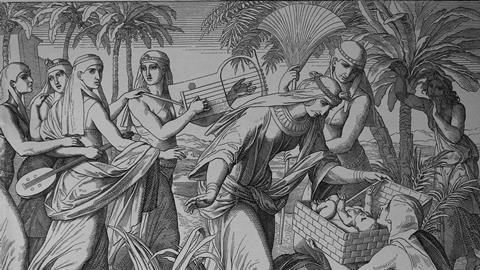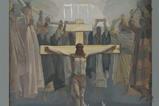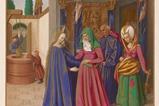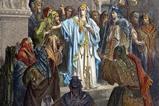Elaine Storkey looks at the stories of Moses and Esther, explaining how they both were instrumental in Israel’s deliverance from its enemies, as well as revealing God’s heart to care for orphans throughout scripture
Study passages: Exodus 2:1-10 and Esther 2-7
The authors of the Old Testament loved telling stories of their Jewish heroes and heroines. They especially revered those from disadvantaged origins who overcame all odds to become the protectors of their people. Israel faced many periods of conflict and upheaval during the hundreds of years covered in the Hebrew scriptures and, in times of persecution, special courage was needed.
These stories remind us that our human identity is complex and takes on many facets
This month I was drawn to two striking stories, from very different times in Israel’s history: First, Moses, who escaped Pharoah’s butchery of baby Hebrew boys by the care and love of his mother and sister Miriam and went on to be Israel’s great liberator. Next there is Esther, a young Jewish outsider living in Persia, averted the bloodshed, and even genocide, of her people. In these stories we see how two Jewish characters from very ordinary backgrounds were used by God to thwart the actions of their enemies. What is also interesting is the other special characteristic they had in common – they were both children of adoption.
Digging in to the stories
The story of Moses is very well known. The Jews had been in Egypt since the time of Joseph, who had become one of the significant officials of the Pharoah of his day. But, hundreds of years later, the amazing wisdom and leadership of Joseph had been forgotten and the current Pharoah was alarmed at the size of the Jewish population in his country. He had many enemies and was afraid of what could happen were the Israelites ever to side with them. His decree that all the baby boys should be killed was his way of cutting back on the population growth of these non-Egyptians. But Moses’ mother and sister were not going to surrender their precious baby to a cruel death, and took the courageous step of hiding him in a basket in the bullrushes in the river Nile (Exodus 2:3). The fact Pharoah’s daughter went to bathe at that very spot in the river can only have been God’s amazing timing and providence. Seeing the basket and asking her servants to bring it to her was predictable for a curious young woman (vv5-6). Her compassion for the baby seemingly outweighed any fear of going against her father’s edicts, and she readily accepted the offer of a Hebrew wet nurse from Moses’ quick-witted sister (v7). So, fed with his own mother’s milk, Moses was well nurtured by those who loved him, adopted by the princess and brought up safely to adulthood in the palace. Ultimately, this prince of Egypt would claim his identity and lead his own people, the Israelites, out of captivity. Through many miracles of deliverance sent by God, an adopted son would change the history of Israel.
The story of Esther has several surprisingly similar overtones. An orphan, she was adopted by her cousin, Mordecai, who protected her and safeguarded her Jewish heritage, for she too was living in a country which was not her own, in this case, Persia (Esther 1:7). Again, God’s timing was perfect, for turmoil at the palace and the banishing of Queen Vashti by the Persian King Xerxes meant that another wife had to be found for him. Esther’s outstanding beauty meant that she was noticed by Xerxes, who married her and made her his queen (vv8-9). He was not aware at first of her Jewish identity and she was able to learn of a plot to kill all Jews by Haman, his advisor (Esther 3:5-15).
With encouragement from Mordecai, she acted with enormous courage and wisdom and initiated an approach to the king (which could have brought penalty of death – see Esther 4:6-17). Her brave action ensured that the ruthless plan to annihilate her people was foiled and their enemy hanged on the very gallows he had built for them (Esther 7:10). It is not surprising that rabbinic tradition puts her among the seven women they regard as prophets. Once again, a person of adoption was used to bring deliverance and safety to the people of Israel.
What these stories teach us
These stories remind us that our human identity is complex and takes on many facets. Both Moses and Esther lived in a context where their birth identity was not at first known to others, so it did not define them. The Jewish textual interpretation (midrash) asserted that although Jochebed gave birth to Moses and nursed him for 24 months, he was called the son of Bithiah, Pharoah’s daughter, because she was the one who raised him. Esther was a queen in Persia. Yet they were both called to liberate the people of Israel. Ultimately, the identity of each of us is given to us by God and we are called to live our lives as God’s children.
When the Bible speaks about adoption it is always to commend the giving of love
Both Moses’ and Esther’s stories also show us the importance of adoptive parents and highlight the love and care that they give to enable a person to flourish. Caring for their adoptive child involved levels of sacrifice and risk for both Bithiah and Mordecai, yet they fulfilled their parental role with love. Their adopted children lacked nothing in terms of care and compassion. The stories also illustrate that the process of human adoption can be God’s way of overriding early loss and bring new hope and life to others. When the Bible speaks about adoption it is always to commend the giving of love. This is as true for adopted children and adoptive parents as for anyone.
The biblical mandate to care for orphans
Elsewhere in the Bible, the authors address adoption in the context of loss and vulnerability. So many references show God’s special care for orphans: children whose birth parents are no longer there for them. The defencelessness of orphaned youngsters is something God urges all of us to take seriously. At the broadest level it is part of working for justice as the prophet Isaiah tells us, echoing back to the Mosaic Law in Deuteronomy 10. He urges us to learn to do right and seek justice, to “defend the oppressed, take up the cause of the fatherless” (Isaiah 1:17). Psalm 82:3 takes up the same theme: “Defend the weak and the fatherless; uphold the cause of the poor and the oppressed.” Other psalms also remind us that God is the Father to the fatherless and the one who sets the lonely in families. Psalm 68:5-6 and Psalm 146:9 both echo this, maintaining that God is a father to the fatherless. It is not only in the Old Testament that we find this. James highlights it, stressing in his letter to the churches that care for orphans is a hallmark of true belief: “Religion that God our Father accepts as pure and faultless is this: to look after orphans and widows in their distress and to keep oneself from being polluted by the world” (James 1:27).This might well be a tall order for us, but compassion and love for those orphaned is close to the heart of God.
The New Testament also links adoption with salvation. Paul used the analogy when he referred back to the Roman Law and showed that when God the Father adopts us as his children, he gives us his spirit and confers on us all the privileges of ‘sonship’ reserved in law for sons born in the generational line. This ‘spiritual adoption’ is a powerful, freeing-up process. We are given the right to cry “Abba Father” and the invitation to live in freedom not slavery (Romans 8:15).
How should we respond today?
We don’t have the same focus on inheritance that was in the Roman Law, but we do know that fostering and adoption are a crucial part of the world we live in. So many children are orphaned through war, famine and disease; many birth parents are not able to nurture and care for a child. The call in the scriptures is a call to us today: to churches, Christian couples, families and single people to reach out in parental love to children not born to them. In the UK, every 15 minutes a child comes into care and over 2,000 children are waiting for adoption, half of them for over 18 months. So many of them will be traumatised by loss or neglect and desperately need a secure place of love they can know as their home. The necessity is urgent. Whether through foster care – short or long-term – or adoption, children in our own towns are waiting to be loved, blessed and cared for.
It is encouraging that Christian initiatives have taken the biblical call seriously, and highlighted the Church’s responsibility in this area. Organisations like Home for Good and Safe Families (now merging with each other) show us what’s needed in our culture today. Whether through the support of isolated, overwhelmed families or in the encouragement of new foster homes and adoptive parents, they are challenging every Christian to seek God for what part we might play. Let’s join them in prayer.


































No comments yet